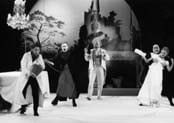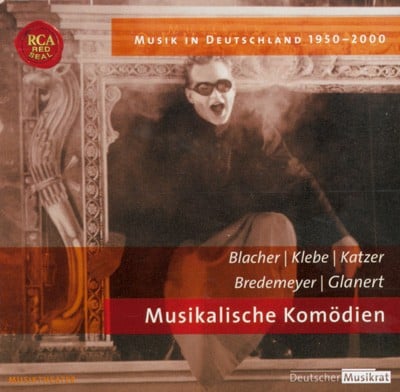OPERA SEARCH

Scherz, Satire, Ironie und tiefere Bedeutung
(Jest, Satire, Irony and Deeper Meaning) (1999/2000)Libretto by Jörg W. Gronius (G)
Major roles: S,CT,2T,Bar,2B; minor roles: 2S,A,T,Bar,B,pantomime;
2(I,II=picc,alto rec).2(II=corA).2(II=bcl).1.dbn-2.2.1.1-timp.perc(3):I=whip/4tpl.bl/t.bells/pasteboard rattle(sm)/wdbl/SD/BD/susp.cym/tgl/glsp/anvil/tamb/2tom-t(sm,lg)/flexatone/chin.cym; II=wind machine/vib/crot/pasteboard rattle(med)/susp.cym/gong(Eb)/glsp/anvil/chin.cym/cym/wdbl/SD/cow bell(lg); III=flexatone/BD/2tam-t(sm,lg)/pasteboard rattle(lg)/xyl/gong(Eb)/wood dr/3cans(sm,med,lg)/cardboard box(lg)/rattle/whip/cow bell(lg)-harp-pft(=cel,elec.org)-strings(min.6.5.4.3.2)-tape
Abbreviations (PDF)
Bote & Bock
Opernhaus, Halle
Fred Berndt, director
Conductor: Roger Epple
Company: Opernhaus Halle
| THE DEVIL | Counter tenor (partly with voice transformer) |
| THE BARON | Buffo bass |
| LIDDY, his daughter | Soprano |
| FREIHERR VON MORDAX | Buffo bass |
| HERR VON WERNTHAL | Baritone |
| RATTENGIFT, a poet | Character tenor |
| MOLLFELS | Lyric tenor |
| THE SCHOOLMASTER | Dramatic baritone |
| GOTTLIEBCHEN | Soprano (or Soubrette) |
| FOUR NATURAL SCIENCE ACADEMICIANS | Soprano, alto, tenor, bass; Choir soli possible |
| DEVIL'S GRANDMOTHER | Pantomime |
| 13 journeymen tailors | Ballet |
| 13 accomplices | Ballet |
| 13 gendarmes | Ballet |
The gardens in front of, and inside the Baron's castle; a classroom; in the woods; the wood castelet of Lopsbrunn.
An infernal accident has transported the Devil to earth. In vain the natural science academicians attempt to analyse him. Meanwhile evil has already infected the next generation. Gottliebchen, the German schoolteachers' hope for the national genius of the future, proves to be genocidal. In the end it only requires one gesture from him to make the whole of society fall into the abyss and vanish from sight. Only the lovers whom he curses survive. Society needs no Devil to destroy itself. Evil is with us. One can only laugh about it.
"The Devil spins his intricate plots, setting everybody against each other, driving things towards the great showdown... and providing Glanert with the occasion to create highly colourful and effective music theatre. Henze’s pupil once again demonstrates his sure touch with the musical characterisation of his cast, with the exact timing of scenes and the highly wrought sequence of solos and ensembles... he offers all that the orchestra and operatic history can supply... in a score that, for all its full colour, realises its musical ideas in a clear and economical structure..." (Johannes Hirschler, Die Deutsche Bühne, Mar 2001)
"Thrilling and resounding, furnished with the most extraordinary instrumental effects, the music rises from the depths, delicately worked even where it describes the banalities of ordinary life, ennobling the grotesque with demonic intensity... Glanert’s opera, highly intelligent and sensual, can permit itself any number of allusions and quotations without losing its originality... Larger opera houses would also relish this work. The whole thing is a devilish delight." (Volker Tarnow, Die Welt, 05 Feb 2001)
"In the end everything goes to the Devil: the castle in ruins, the characters gone in a whirlwind, the scientists with their test tubes. And the Devil is called home by his Grandmother. Judging by her blonde and buxom Alpine outfit, Hell can only be one of those TV programmes with forced audience participation... at the end of the two hour performance, the public joyfully acclaimed a welcome operatic newcomer." (Joachim Lange, Leipziger Volkszeitung, 05 Feb 2001)
"Glanert has found a musical language which is not only sensitive and witty but also intelligent and easy to follow. This is why a strange thing, rarely to be seen in today’s music theatre, happens to his works: they are performed… With great skill, Glanert draws on music history, from a sentimental arioso to expressive dissonance, from ballet music with slightly modern harmonies to dance-like musical rhythms. Nevertheless, his operas never create an impression of eclectic patchwork: the music both narrates and comments, while the stage action is always accompanied by an alert orchestra… After his success in middle-sized opera houses, Glanert makes his way to the big stages – because he writes works that fit our time and points the opera in direction of the future." (Stefan Keim, Die Welt, 29 Dec 2004)
Comic

Produktion Opernhaus Halle 2001
(Deutscher Musikrat – Musik in Deutschland 1950–2000 / Musiktheater: Musikalische Komödien)
BMG Classics 74321 73633 2
